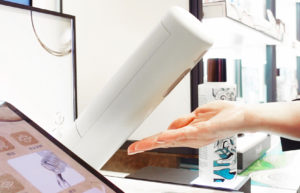What is the Future of Beauty?
7 emerging global beauty technological trends to look out from NRF and CES 2022

CES & NRF 2022
January 2022 – The future of beauty is paved with radical technological innovations manifesting through sustainable initiatives & an alchemy of experiences. Expounding from the recent National Retail Federation (NRF) & Consumer Electronics Show (CES) events, Meiyume aims to identify the top 7 emerging global beauty technological trends that brands and retailers can expect in 2022.
1. Sustainability
The term sustainability has become a hot-topic throughout many industries, with many variations of its approach. As consumers are looking to brands and businesses for solutions rather than governments and organisations, brands are expected to be purpose-driven to solve global and social issues. A 2022 study by NRF indicates that 62% of respondents are willing to change their spending habits just to reduce environmental impact, an increase from 57% in 2020. Furthermore, 50% of respondents are willing to pay an average of 70% premium for sustainable products.

CES 2022 showcased many cutting-edge sustainable technologies such as Grov’s indoor vertical farming, Tesla’s electronic vehicles, virtual booths, and Samsung’s solar remotes. Interestingly, the conception of solar-powered remotes has already been adopted into the beauty industry globally. Solar-powered devices are an eco-friendly alternative that utilises synthetic lights and natural light to charge themselves, negating batteries and electricity. Dream Box Beauty was quick to jump onto this sustainable innovation with its facial massager beauty wand. SoulTree in India took it a step further with their cutting-edge sustainable flagship store. The boutique is designed with biodegradable materials and powered by solar energy.
2. Metaverse

Digitalisation is inevitable and the pandemic simply accelerated the paradigm shift towards digital transformation. This continues to disrupt the way consumers and brands interact and penetrate the beauty industry through its futuristic retail concepts, combining the digital and physical worlds (i.e. ‘phygital’)
At one end of the spectrum, this amalgamation of the virtual and physical world has been demonstrated by Allure’s new boutique concept in NYC. This concept allows shoppers to shop ‘inside a magazine’ with smart mirrors, iPads, interactive QR codes, AR virtual try-on, all of which streamlines the customer journey and enhances the shopping experience.
3. Virtual Reality (VR) & Augmented Reality (AR)

The fast-growing digital tapestry necessitates the adoption of numerous features that beauty brands and retailers can draw towards. VR & AR enhances the experience through its immersive qualities strengthening interaction between brands and consumers. One creative example in the beauty sphere would be the interactive augmented makeup software that allows consumers to have a virtual makeover of their preferred look and share it via social media. Many beauty giants such as Chanel, Maybelline, Sephora, to name a few, have jumped on the bandwagon of this trend.
Due to the pandemic, CES capitalised on virtual booths for their digital exhibition which reduced emissions from travelling too. Other beauty conglomerates like Loreal rolled out virtual stores to immerse their consumers’ into a virtual world and connect with consumers in a transformational and contactless method.
4. Frictionless Shopping

Through Artificial Intelligence (AI), brands will continue to expand and improve the connection with consumers by collecting actionable insights and providing solutions through automation. Amazon’s ground-breaking ‘Just walk out’ technology reinforced the power & extensiveness of AI-powered contactless shopping. CES & NRF have also showcased how Instacart incorporated smart cards to bypass checkout in retail stores to streamline the customer experience.
As contactless shopping & automation is here to stay, more beauty brands and retailers will welcome AI-powered frictionless shopping through RFID tags, radar sensors, touchless testers, contactless payment, anonymous demographic and traffic cameras, and a comprehensive CRM (Customer Relationship Management) system, among others.
5. Real-time Interaction

With the quick domination of digitalisation, consumers are expecting on-demand services and information as seen with the growth of live streaming and (over-the-top) OTT advertising. Beauty brands should utilise real-time data to curate targeted content online and in-store, as illustrated with Shiseido’s interactive life-and-learn technology using anonymous demographic cameras.
Seeing that NRF reinforced the impressive development and importance of e-commerce, it is no surprise that beauty brands’ tactics have evolved to embrace livestream commerce. This method opens doors to high engagement and real-time interaction, catering to consumers’ increasing desire for on-demand purchases.
6. Engaging Experiences


NRF shared that as shoppers return to physical stores, they will be expecting an elevated experience that delightfully engages them and allows for interactivity. Innovative technologies such as the touchless testers are a fun twist that is becoming a new norm in beauty retail stores worldwide due to their high engagement rate and minimized touchpoints.
To further drive tangible experiences, brands such as Kiehl’s, have installed interactive displays from Meiyume with an anonymous camera that triggers content based on the demographics of consumers, driving personalised & engaging experiences for shoppers.
7. Hybrid Shopping Experience

The platitudes perennially shared in all business landscapes in the past are to be a ‘data company’ or a ‘technological company.’ However, with consumers becoming more empowered and intelligent, and the growing expectations of consumers, being an ‘experience company’ is vital in this day and age. As such, priority is placed on the nature of delivering the experience, through beauty products or its retail store.
Alibaba Chairman, Jack Ma, coined the term New Retail, describing it as “ an integrated model where offline, online, logistics, and data, converge to enhance customer experience.” This step up from omnichannel commerce is emphasised by NRF & CES on the agile need for hybrid shopping. Meiyume, alongside the beauty industry, has begun approaching this novel concept – our anti-counterfeit solutions enable brands to use a unique clone-proof identification code to track and trace their product through the supply chain, prove its authenticity, enable consumer engagement, and gather business intelligence from its storefront to the consumers’ mobile phone.
Future of Beauty
This new era for the beauty industry poses new challenges with exciting opportunities. As elucidated from NRF & CES 2022 trade shows, remaining vigilant and open to new innovations will surely ensure a seamless adaptation to this evolvement of the future of beauty.
Trust Meiyume as your global partner in product solutions and retail solutions, where we commit to helping beauty brands infuse bespoke innovation into their business operations. Contact us at marketing@meiyume.com for more information on our product and retail solutions.